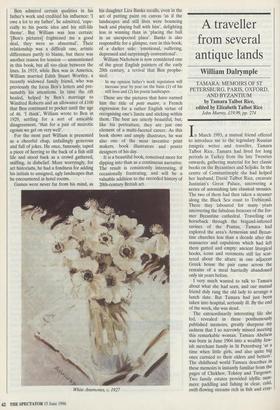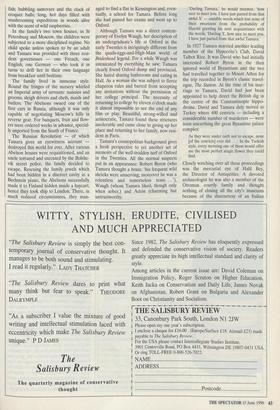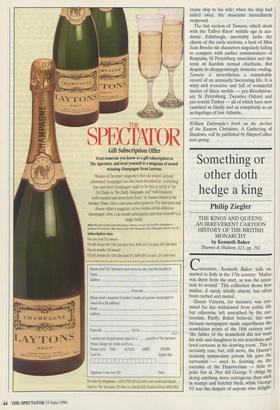A traveller from several antique lands
William Dalrymple
TAMARA: MEMOIRS OF ST PETERSBURG, PARIS, OXFORD, AND BYZANTIUM by Tamara Talbot Rice, edited by Elizabeth Talbot Rice John Murray, f19.99, pp. 274 In March 1993, a mutual friend offered to introduce me to the legendary Russian emigrde writer and traveller, Tamara Talbot Rice. Tamara had lived for long periods in Turkey from the late Twenties onwards, gathering material for her classic books on the Byzantines and Seljuks. In the centre of Constantinople she had helped her husband, David Talbot Rice, excavate Justinian's Great Palace, uncovering a series of astonishing late classical mosaics. The two of them had then taken a steamer along the Black Sea coast to Trebizond. There they laboured for many years uncovering the fabulous frescoes of the for- mer Byzantine cathedral. Travelling on horseback through the brigand-infested ravines of the Pontus, Tamara had explored the area's Armenian and Byzan- tine churches less than a decade after the massacres and expulsions which had left them gutted and empty: ancient liturgical books, icons and vestments still lay scat- tered about the altars; in one adjacent Greek house the pair came across the remains of a meal hurriedly abandoned only six years before.
I very much wanted to talk to Tamara about what she had seen, and our mutual friend duly rang the old lady to arrange a lunch date. But Tamara had just been taken into hospital, seriously ill. By the end of the week, she was dead.
The extraordinarily interesting life she led, revealed in these posthumously published memoirs, greatly sharpens nlY sadness that I so narrowly missed meeting this remarkable woman. Tamara Abelson was born in June 1904 into a wealthy Jew- ish merchant family in St Petersburg 'at a time when little girls, and also quite big ones curtsied to their elders and betters'. The childhood world Tamara describes in these memoirs is instantly familiar from the pages of Chekhov, Tolstoy and Turgenev. Two family estates provided idyllic sum- mers: paddling and fishing in clear, cold, swift-flowing streams rich in fish and cray- fish; bubbling samovars and the clack of croquet balls; long, hot days filled with mushrooming expeditions in woods alive with the scent of wild raspberries.
In the family's two town houses, in St Petersburg and Moscow, the children were subjected to a more disciplined regime. No child spoke unless spoken to by an adult and Tamara was provided with three resi- dent governesses — one French, one English, one German — who took it in turns to drill her in their own language from breakfast until bedtime.
The family lived in immense style. Round the fringes of the nursery whirled an Imperial army of servants: nannies and grooms, sleigh drivers and chefs, maids and butlers. The Abelsons owned one of the first cars in Russia, although it was only capable of negotiating Moscow's hills in reverse gear. For banquets, fruit and flow- ers were ordered weeks in advance, special- ly imported from the South of France.
The Russian Revolution — of which Tamara gives an eyewitness account destroyed this world for ever. After various Abelson houses were requisitioned, and an uncle tortured and executed by the Bolshe- vik secret police, the family decided to escape. Rescuing the family jewels which had been hidden in a discreet cavity in a Bechstein piano, the Abelsons successfully made it to Finland hidden inside a haycart; hence they took ship to London. There, in much reduced circumstances, they man- aged to find a flat in Kensington and, even- tually, a school for Tamara. Before long she had passed her exams and went up to Oxford.
Although Tamara was a direct contem- porary of Evelyn Waugh, her description of an undergraduate's life at Oxford in the early Twenties is intriguingly different from the quails-eggs-and-High-Mass world of Brideshead legend. For a while Waugh was intoxicated by everything he saw; Tamara clearly found Oxford damp and provincial. She hated sharing bathrooms and eating in Hall. As a woman she was subject to fierce chaperon rules and barred from accepting any invitations without the permission of her college principal. The necessity of returning to college by eleven o'clock made it almost impossible to see the end of any film or play. Beautiful, strong-willed and aristocratic, Tamara found these strictures intolerable and came close to giving up her place and returning to her family, now resi- dent in Paris.
Tamara's cosmopolitan background gives a fresh perspective to yet another set of memoirs of the well-trodden turf of Oxford in the Twenties. All the normal suspects put in an appearance: Robert Byron (who Tamara thought a brute: 'his frequent wild shrieks were unnerving; moreover he was a relentless and remorseless tease. . . '), Waugh (whom Tamara liked, though only when sober,) and Acton (charming but untrustworthy:
`Darling Tamara,' he would murmur, 'how nice to meet you. I have just parted from that awful X' — amiable words which lost none of their sweetness from the probability of Harold greeting his next acquaintance with the words, 'Darling Y, how nice to meet you.
I have just parted from that awful Tamara.'
In 1927 Tamara married another leading member of the Hypocrite's Club, David Talbot Rice. It was David who had initially interested Robert Byron in the then ignored world of Byzantium and the two had travelled together to Mount Athos for the trip recorded in Byron's classic travel- ogue, The Station. At the time of his mar- riage to Tamara, David had just been appointed to help direct the British dig in the centre of the Constantinople hippo- drome. David and Tamara duly moved to Turkey where 400 convicts — including a considerable number of murderers — were soon unearthing the great Byzantine palace complex:
As they were under oath not to escape, none [of the convicts] ever did . . . In the Turkish style, every morning one of them would offer me the most perfect single flower they could find.
Closely watching over all these proceedings was the mercurial eye of Hall Bey, the Director of Antiquities. A devoted archaeologist he was also a member of the Ottoman courtly family and thought nothing of closing all the city's museums because of the discourtesy of an Italian cruise ship to his wife; when the ship had sailed away, the museums immediately reopened.
The last section of Tamara, which deals with the Talbot Rices' middle age in aca- demic Edinburgh, inevitably lacks the charm of the early sections, a host of Miss Jean Brodie-ish characters singularly failing to compete with earlier reminiscences of Rasputin, St Petersburg anarchists and the tents of Kurdish nomad chieftains. But despite its disappointingly domestic ending, Tamara is nevertheless a remarkable record of an unusually fascinating life. It is witty and evocative and full of wonderful stories of three worlds — pre-Revolution- ary St Petersburg, Twenties Oxford and pre-tourist Turkey — all of which have now vanished as finally and as completely as an archipelago of lost Atlantis.
William Dalrymple's book on the decline of the Eastern Christians, A Gathering of Shadows will be published by HarperCollins next spring.




































































 Previous page
Previous page